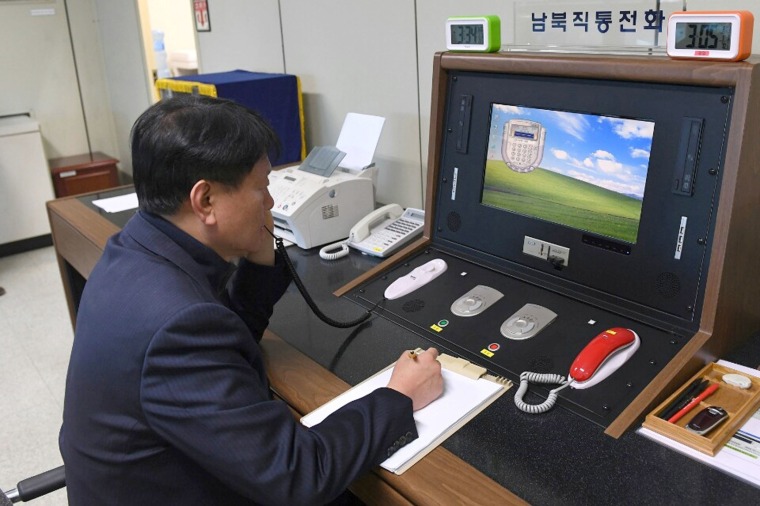Rare talks proposed by both North and South Korea might calm tensions between the neighbors, but don't expect Kim Jong Un to give up his nuclear arsenal any time soon, experts say.
Kim used his annual New Year's Day message to suggest that his officials could meet their Seoul-based counterparts to discuss sending athletes to participate in the PyeongChang Winter Olympics next month in South Korea.
South Korea responded Tuesday by proposing that talks could be held next week in the so-called truce village of Panmunjom, the only place in the Demilitarized Zone between the two Koreas where soldiers from both countries are stationed.
After months of acrimony, Kim also opened a key cross-border communication channel with South Korea on Wednesday. South Korea later confirmed that the two Koreas held a 20-minute discussion, with liaison officials exchanging their names and examining the communication lines to make sure they were working.
These olive-branch overtures mark a significant milestone, according to analysts.
The Koreas officially remain at war, six decades after the Korean War ended in an armistice rather than a peace treaty in 1953. Friction has built over the past year, fueled by the North's nuclear and missile tests and apocalyptic rhetoric from Kim and President Donald Trump. Kim has repeatedly threatened to destroy the South along with the U.S., while Trump has threatened Pyongyang with "fire and fury."
Trump also boasted on Twitter Tuesday that he has a bigger and more powerful "nuclear button" than Kim does.
North Korea has stated that it wants an official end to the Korean War, full normalization of relations with the U.S. and to be treated as an equal in the global arena.
If a meeting does happen next week, it would be the first inter-Korea talks since 2015.
Given the rarity and gravity of such an encounter, it's unlikely the discussion would be limited to just next month's Winter Games, according to Hazel Smith, an expert on North Korea and a professor at London's School of Oriental and African Studies.
"Any situation where North and South Korea start talking to each other will provide an avenue between the two states, so that must be positive," Smith said. "They would be opening up a pathway at the highest level."
There are several theories as to why North Korea has chosen this moment to signal it's ready to speak with South Korea.
The past 12 months have seen the secretive state achieve several technical milestones in its weapons program, launching its first three intercontinental ballistic missiles and conducting its most powerful nuclear test to date.
Most analysts believe North Korea doesn't want to strike first, conscious that doing so would most likely result in the country's destruction. However, the North believes nuclear weapons are likely to deter the U.S. from trying to topple the Kim regime.
Pyongyang's officials have suggested in the past that they would be willing to negotiate with Washington and its allies, but only after building a nuclear weapon capable of hitting the U.S. mainland — something it now claims to have done.
"They have been very open about this, and the most recent statement from Kim Jong Un does not reflect a departure from that policy. It reflects confidence," Smith said. "If North Korea can use this position of strength to de-escalate the conflict, so they reduce sanctions, have better relationships with South Korea and more economic investments, they will seek ways to do that."
"They feel they are on a collision course with the U.S. so they want to cool it down"
Secretary of State Rex Tillerson recently offered unconditional talks with North Korea only to be quickly shot down by the White House, where not only Trump has talked up the possibility of military confrontation. National security adviser H.R. McMaster also has warned the potential for war is "increasing every day."
Andrei Lankov, a professor of Korean studies at Seoul's Kookmin University, believes Kim is acting more out of caution than confidence.
He believes that the North Koreans want to talk because they fear any further advancement of their weapons program could provoke a violent reaction from Trump.
"They feel they are on a collision course with the U.S. so they want to cool it down, maybe, by using face-saving measures and keeping their gunpowder dry," he said. "It's the beginning of what can be described as a charm offensive by the North Koreans."
Most analysts agree, however, that the talks don't represent the first steps toward the North giving up its nuclear weapons — the primary U.S. goal in the impasse.
In this sense, the proposed talks represent a positive step for South Korea, potentially leading to closer diplomatic and economic ties, but do little to satisfy the immediate U.S. concerns of Kim's nuclear status.
"South Korea is going to have a very different agenda potentially than [the U.S.]," Richard Haas, the president of the Council on Foreign Relations, told MSNBC's "Morning Joe" on Tuesday. The talks "might be good for South Korea but it will do nothing to scratch our itch, which is the looming missile and nuclear threat."
This has led some to speculate that Kim is trying to use the prospect of talks to drive a wedge between South Korea and the U.S. — allies who might have a difference of opinion on possible talks with the North.
Both the North Korean and South Korean governments have said that "they are looking to engage in talks, but the U.S. has been pushing a strategy of completely isolating North Korea," Smith said. "What we can say is the South Korean statement is not in line with the U.S. policy of isolating North Korea in every way it can."

